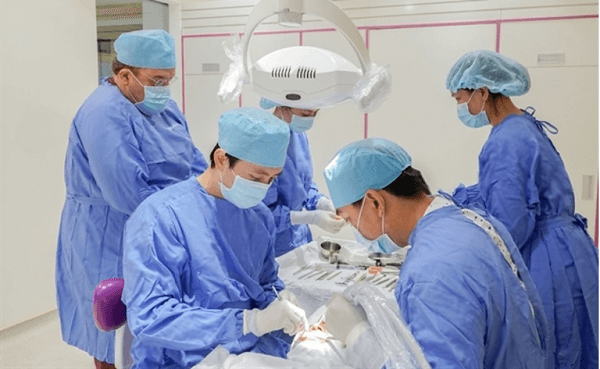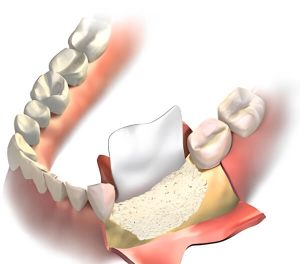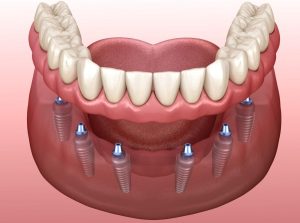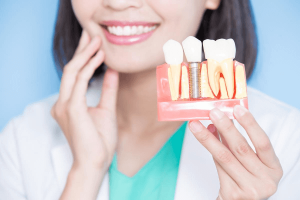Table of content
Dental implant safety is a common concern for many patients. In reality, dental implants are highly safe and come with minimal risks of severe complications when performed by skilled professionals at a reputable clinic. Adhering to proper post-operative care also ensures a smooth recovery process.
1. Are dental implants dangerous?
Dental implants are currently the most advanced solution for replacing missing teeth, ensuring safety and effectiveness for most cases. Patients can rest assured about the procedure, thanks to the following benefits:
- The implant acts like a natural tooth, restoring over 90% of chewing function and allowing patients to eat comfortably.
- By maintaining proper chewing activity, dental implants help prevent jawbone resorption.
- Unlike dental bridges, implants minimize the impact on surrounding healthy teeth, preserving them optimally.
- Implants are made from premium titanium, a biocompatible material proven to be safe for human health.
- Modern implant techniques emphasize aesthetics, particularly soft-tissue aesthetics, resulting in a natural, radiant smile.
- With proper care, implants can last a lifetime, making them a durable and sustainable option.
Given the technical precision required, choosing a reputable clinic with experienced dental professionals is crucial to ensuring the procedure’s success and safety.
>> Tips for you: 4 steps to take care of your dental Implants Comparison between Implant and other kind of prosthesis
2. Possible complications of dental implants
While the success rate of dental implants is exceptionally high, certain complications can occur due to insufficient expertise, improper procedure execution, or inadequate post-care habits. Common issues include:
2.1. Infection at the Surgical Site
Infections may arise if sterilization standards are not strictly maintained, allowing bacteria to accumulate and invade the surgical area.
2.2. Persistent Bleeding
Improper implantation techniques can lead to continuous bleeding, requiring immediate evaluation and intervention by a dentist.
2.3. Nerve Damage
Poorly executed implant placement can damage nerves beneath the alveolar bone, causing numbness, pain, or tingling sensations in the lips, tongue, or gums.
2.4. Implant Rejection
Implant failure is typically attributed to poor placement techniques, substandard implants, or improper post-operative care. Symptoms include gum inflammation around the implant, changes in gum color, pain during chewing, and difficulty speaking.
Tips for you: >> Is it painful to get dentures? Which method is the least painful? >> How long does dental implant surgery take and what factors affect it? >> Where to Get the Best and Most Reliable Dental Implants in Ho Chi Minh City?
3. How to Minimize Risks in Dental Implants
3.1. From the Patient’s Side
Patients play a vital role in ensuring long-lasting implant results by following proper care routines during these two stages:
After Implant Placement
- Use cold compresses and follow prescribed pain management instructions.
- Stay hydrated and consume soft, non-spicy foods that are not too hot. Avoid using straws for the first five days.
- Refrain from smoking and alcohol consumption, as these can compromise the implant’s stability and healing process.
- Brush gently using a soft-bristle toothbrush, focusing on the implant area.
- Rest during the initial 48 hours and avoid strenuous physical activities to prevent implant loosening.

After Treatment Completion
- Incorporate a water flosser into your oral hygiene routine for better cleaning.
- Schedule dental check-ups every six months to monitor implant health and address any potential issues early.
Additionally, patients must provide a comprehensive medical history for the dentist to develop an appropriate treatment plan.
3.2. From the Clinic’s Side
A high-standard clinic should meet the following criteria to ensure success and minimize complications:
Expertise of the Dental Professionals
Each patient’s condition varies in terms of bone and soft tissue health. Therefore, the dentist must possess both extensive experience and a comprehensive approach to analyze, design, and achieve optimal functional and aesthetic outcomes.
Sterilization Standards
To safeguard patients against cross-contamination, clinics must maintain strict sterilization protocols, including clean facilities and properly sterilized instruments.
Implant Quality
Clinics should use certified implants from reputable manufacturers to ensure the best biocompatibility and safety for patients.
Advanced Equipment
Modern technology significantly aids in precise planning and execution of dental implants, reducing treatment time and ensuring better outcomes for patients.

4. Trusted dental implant clinic in Ho Chi Minh City
At Elite Dental, numerous patients have restored their youthful smiles with our comprehensive implant solutions. Here’s why you should choose us for your dental restoration needs:
4.1. Leading Reputation
Elite Dental is proud to be Vietnam’s first certified “Advanced Implant Training Center” under Straumann, the world-leading implant brand from Switzerland.
4.2. Expert Team
Our highly skilled dentists, including Dr. Trần Hùng Lâm, bring international expertise and years of hands-on experience. Dr. Lâm’s research on “ProArch Implant Techniques for Full-Arch Restorations” achieved a 99.8% success rate and was published in Journal of Dental Implant Research (JDIR).
4.3. State-of-the-Art Facilities
Elite Dental offers a world-class surgical environment with advanced technologies, including CBCT scanners, Anthos surgical chairs, and PRP centrifuges for accelerated healing.
4.4. Certified Implant Materials
We only use premium implants sourced directly from leading brands in the USA, Europe, and South Korea, ensuring quality and safety.
4.5. Stringent Sterilization Protocols
Our clinic adheres to international sterilization standards, creating a safe and hygienic treatment space for every patient.
Restore your confidence and smile with the most advanced implant solutions at Elite Dental. Schedule your consultation today!
Tips for you: >> Should You Get Dental Implants? Addressing 7 Common Concerns >> Does Getting Dental Implants Hurt? What Factors Influence the Pain?







